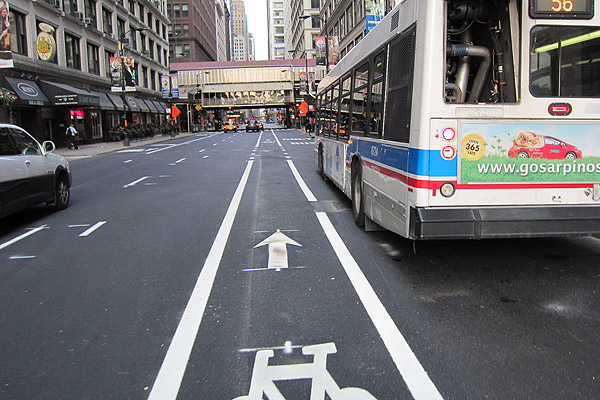
In reading up on Tracey Meares and legitimacy, I came across an interesting question she asked: why do people stop at red lights?
No, really: drivers almost always stop at stop lights, even though they could regularly get away with not doing it. Particularly, as Meares mentions, late at night when the streets are clear.
Who doesn't? Cyclists. It's one of the complaints I'll willingly grant people who rail against cyclists, and recently I've been paying close attention to how often people blow red lights on bikes. It's frequent, and actually most frustrating for me when I'm on a bike: a couple times in the past couple weeks, I've passed someone, been passed at a red light, and then had to pass the person again, which is doubly frustrating because, for obvious reasons, I want to minimize the time I'm riding farther out in the lane to get around someone. Having to pass someone twice is a statistically minor but still nerve-wracking and unnecessary risk.
I don't think it's just me (or the people who complain about it so vociferously) overstating how frequently cyclists run red lights—an Australian study published last month found that 40 percent of cyclists in that country have run them. That was a survey; a field study in London found much lower numbers (a mere 16 percent), and another field study in Australia found an even smaller number of violators. A Portland State field study found an astonishing 56 percent, but that was counting rolling stops as violations, and perhaps reflects the looser interpretations of the law on a college campus.
People like Randy Cohen aren't helping matters, though perhaps the NYT's ethicist is instructive:
I roll through a red light if and only if no pedestrian is in the crosswalk and no car is in the intersection — that is, if it will not endanger myself or anybody else. To put it another way, I treat red lights and stop signs as if they were yield signs. A fundamental concern of ethics is the effect of our actions on others. My actions harm no one. This moral reasoning may not sway the police officer writing me a ticket, but it would pass the test of Kant’s categorical imperative: I think all cyclists could — and should — ride like me.
Even the thoughtful cyclists I know slow and yield at stop signs, coming to a near-halt without planting their feet, but they also come to a full stop at stop lights. Why? I'd submit that Cohen's behavior does harm people: drivers who do it learn to fear cyclists (there's a reason some streets have stop signs, and others red lights; it's not just random); fear leads to anger; anger leads to less tolerance for cyclists, fewer cyclists on the road, and less favor for cyclists when it comes to things like infrastructure. Perhaps it's a stretch, but I believe it. I see Cohen's categorical imperative and raise him.
Meares's concept of legitimacy, I think, might be helpful here. There just aren't enough cops to bust cyclists who run red lights, and because cyclists have a bigger field of vision and go slower than drivers, it's even easier to see if there's a cop in position to catch you. So cyclists are going to have to stop because of legitimacy, as Cohen's argument suggests. And that's what the researchers behind that most recent study argue:
In these three instances, researchers from the Monash University Accident Research Center determined that more inclusive road infrastructure, amendments to road rules, and targeted education programs could have a significant impact on making intersections safer and possibly reducing the amount of infractions by cyclists.
[snip]
Educating cyclists on the importance of riding predictably and responsibly–as it relates to their overall safety–could deter some cyclists from bending the rules when no one is around. Even though it’s not always a popular sentiment among the cycling community, as a part of the regular traffic flow bikes are still required to obey stop lights, stop signs, and other basic regulations regardless of whether it’s annoying or inconvenient.
Instead of threatening to withold infrastructure because rogue cyclists don't deserve it, it's worth considering the idea that infrastructure (and cyclist education, which the U.S. neglects) has a legitimating influence on cyclists, emphasizing that they're part of the city, and part of the traffic, rather than a tiny, almost invisible minority—one that, because it's neither considered nor noticed, has no reason to play by the same rules as drivers.
Photograph: Chicago Bicycle Program


